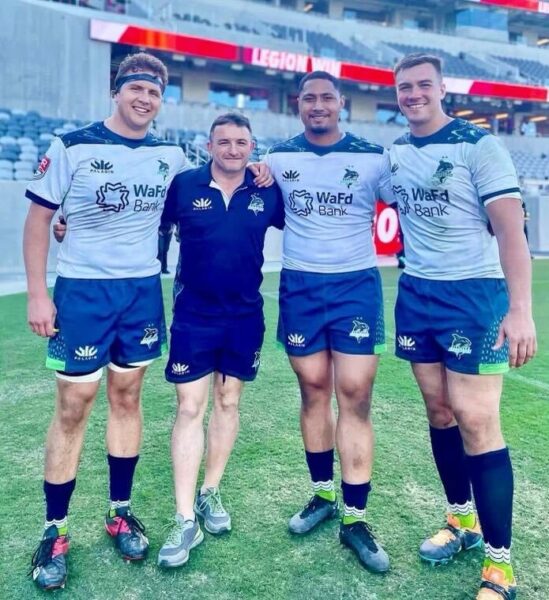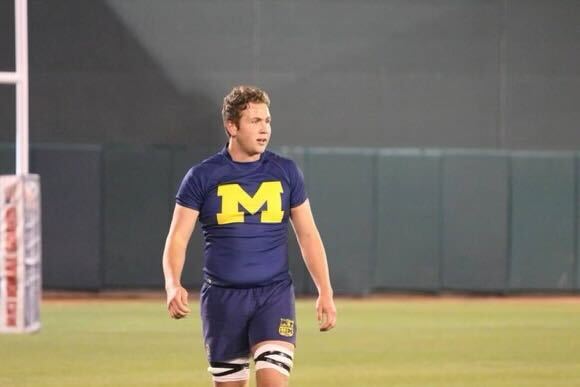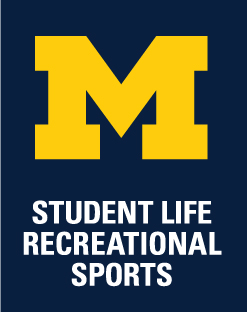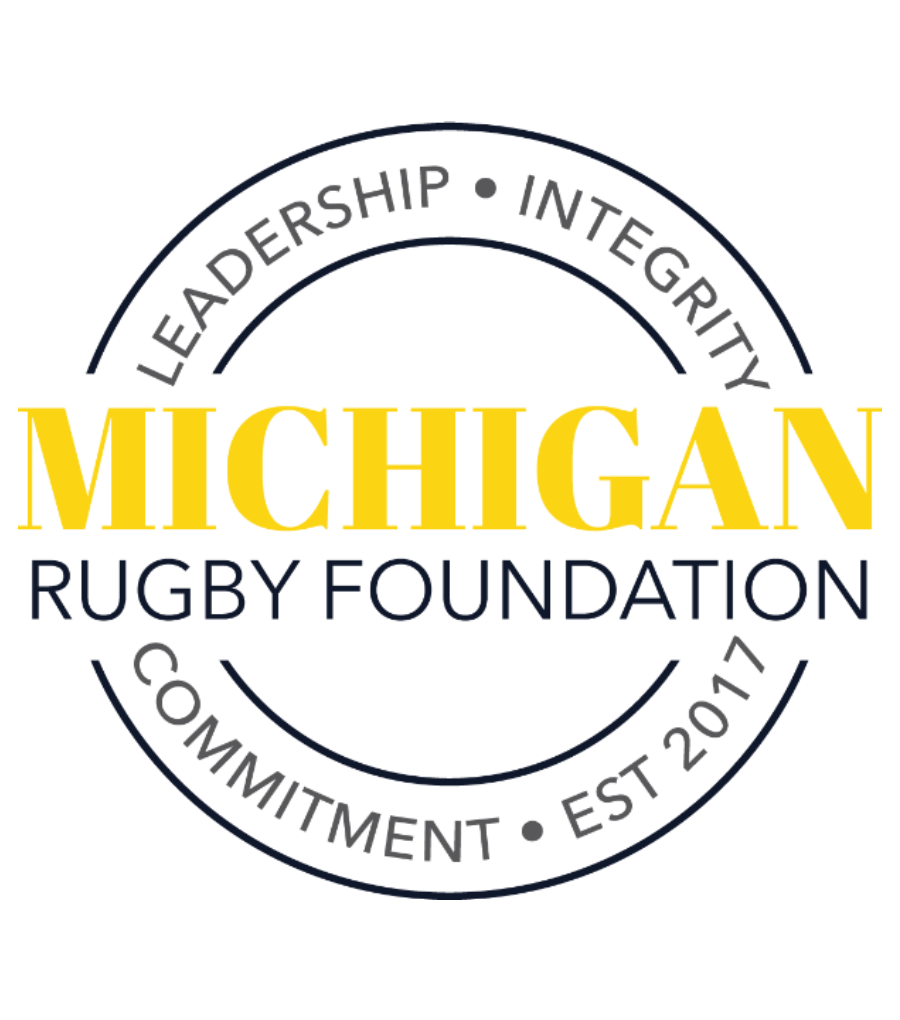On June 18, Michigan Rugby alumnus Jamie Demers (played 2015-2020) was selected to play for the Seattle Seawolves, joining Sequoyah Burke-Combs and Cole Van Harn in the elite club of Michigan ruggers who have gone on to play in Major League Rugby. Jamie’s time as part of Michigan Rugby was eventful: after going to Poneke RFC in 2016, he appeared at USA Rugby U20 Camp in 2017 and Collegiate All-American Selection Camp in 2018 and 2019, and was named part of the 1st Team All-Big Ten in 2019. He served as Michigan’s captain during his senior year before returning to U-M for a Master’s in Naval Architecture and Marine Engineering. Current players Shea Loughnane and Armen Vartanian caught up with Jamie to discuss his experience.

You never played rugby before college; how did you get into it at U-M?
I played football and wrestled all throughout high school so coming into university I really wanted to find a way to stay active, make friends, and have a physical outlet (I’ve always gotten a bit punchy with friends after a long offseason from contact sports). I filled out the recruiting form on the website the summer after graduating high school and I think all it took was me listing myself as 6’4” and 280 pounds to get a very quick response. I met up with the captains (Zach “Boourns” Burns and Cole Van Harn) during my summer orientation and they encouraged me to come stay at the house before move-in for two-a-days. Cut to my parents dropping me off in sheer horror at the White House and I never really thought twice about it from then on.
What was your impression of the club/sport in your first few weeks?
I loved everything about it: the flow of the game, the skill, the physicality, my teammates, the rugby culture. I very much had a body made for playing offensive line for the first year or so which led to some pretty brutal fitness sessions in the beginning, and everything was so new that I remember Coach Sparks seeing the terrified look in my eyes during one of the first full scrimmages and reassuring me that the game would start to feel a lot slower once a learned a little more. I also remember really liking that even I, some big lumbering idiot, was allowed to carry the ball and score in this sport.
Ultimately, it was likely the surrounding culture that ultimately sold me. I loved that the seniors were nice to the freshmen but viciously roasted each other, and I was certainly a fan of the extracurriculars (probably helped that I was decent at taking down a stick of butter in the Farmer’s Challenge and could anchor a boat race). All in all I was a bit too obsessed at the start, and it probably took a couple weeks for me to stop bringing up how cool the rugby team was to anyone that would listen.
Who were your biggest influences as a player at UM?
My namesake is Dr. Drew “Disco” Vecchio, so while I never had the pleasure of playing with him all my teammates were trying to get me to play like him. To this day I’m still trying to recreate his ability to get an offload to a teammate with three defenders hanging off of him. My second row partner for the first few years was Michael Shay, and I learned a lot from him when it came to the primary role of a lock: be big and work hard. Interestingly, he never had any nuggets of wisdom to pass on regarding the attacking side of the ball.
Besides that most of my influences were my coaches. It took a few times getting absolutely demolished by Coach Andrew Stevick in training to realize I should be hitting back just as hard, and there were few if any players in the BTU that could run as hard as him. Coach Billy Becker taught us what it really meant to be a forward and take pride in the set piece. Coach Zach Simkins would always spare some time to show a big lunk how to flick a Sonny Bill. Of course, Coach Brandon Sparks got me up to speed on the fundamentals and intricacies of the game at a shocking pace, and empowered me to lead from early on.
What are your fondest memories of Michigan Rugby?
It’s a true cliche at this point but there really are too many to list. Playing in Cartagena, Guadalajara, and Cambridge and those entire tours were incredible. To be honest, we may have done more losing than winning during my time representing the crest, but I wouldn’t trade the memories for anything. Beating MSU, Minnesota, and Wisconsin during my grad year after a couple seasons of losing to them was a great feeling. Playing in a foot of water in Jackson for a spring 15s game. A game against BGSU getting called early during a blizzard not for cold, but because visibility had gotten too poor. Playing an entire Big Ten 7s tournament with 7 total players after a van crashed on the way there.
It’s funny that most of the memories I just thought of were moments of great pain or adversity. But that’s why we play rugby, right? So we can keep telling ourselves we’re tough manly men while we sit in our cushy office jobs or elite universities and get scared listening to true crime podcasts. Truly the best memories was just doing dumb stuff with my friends. Taking over Charlie’s on karaoke Tuesdays, Super Bowl Super Fry, Farmer’s Challenge, Smash Bros tournaments, fixing the house in a panic when the landlord was about to come over.
You played in several camps as a player at U-M; how did these experiences help you as a player?
I was very fortunate to attend those camps. A lot of it was Coach Sparks believing in me and advocating for me. The single biggest takeaway from those was confidence. It would be a big understatement to say I showed up to those camps feeling completely out of my league with players with years more of experience and playing at a higher level of competition. I really surprised myself that I could actually hold my own among them, and even make some good plays here and there.
After that, coming back to U-M and playing I couldn’t help but think if I can hang with those guys I should be able to do some damage around here. I’m a big guy, but as I’ve played at higher levels I’m not remotely close to being the biggest guy on the field. Those camps were my first dose of that, which was very important to making sure I was developing skills beyond just being big.

What have you done since graduating? Work, rugby, hobbies?
Following my grad year I moved out to Seattle to work for Glosten, a naval architecture and marine consulting firm. I’ve lived and worked there since. I had always counted on and bragged about how easy it would be to make friends in any new city because of rugby, and in a cruel twist of irony I moved out there right in the middle of the pandemic with no rugby being played.
Of course, rugby has since started back up and I’ve greatly enjoyed playing for the Seattle Rugby Club. The club has historically competed in the British Columbia Rugby Union, probably the best amateur competition in North America, and have recently also competed in the Pacific Northwest Rugby Football Union to be eligible for USA Club Nationals. Last year we won the D1 Pacific Super Regional, but unfortunately lost in a thriller during the national semifinals.
Besides that I’ve taken up skiing as a hobby and enjoy hiking with my girlfriend, Carolyn, and our new dog, Rio. I’d also be remiss to leave out our summer softball team, 80 Loafs, that I play on with several local Olde Boys (Zack “Boourns” Burns, Zack “Junior” Burns, Jeremy “Dozer” Reid, Michael Shay and Nick “Squanch” Azzopardi).
How did you break into the MLR? Was there a moment where you got “the call”?
It was early afternoon on a Tuesday when I got a text message from a Seawolves admin asking if I could come to training this week to potentially play in San Diego that weekend. This was very random but luckily our club season had ended just a week or two prior so I was still in good shape. So I showed up to training and after some morning workouts and film review they read the roster and I was on it.
It was the last game of the season with the playoff standings set so they were fielding a mostly developmental side. They had some injuries at second row and back row so they called up me and a couple other club guys to fill in the gaps. Our club (Seattle Rugby Club) had just performed well at club regionals and nationals and we frequently have the Seawolves academy players getting game time with us.
What is your biggest strength as a player? Biggest weakness? How do you play to your strengths and address your weaknesses?
After my second ever game of rugby against Notre Dame my freshman year I got some good advice from Coach Andrew Stevick that I often try to repeat to younger players. As you’re first learning the game, identify two or three areas of the game that you really like or find yourself performing well. Really focus on these areas at first so you can be a real difference maker for the team in some area of play. For me these 3 areas were supporting the ball carrier in the ruck, working on the ground after getting tackled, and owning the set piece. None of these strengths are all that flashy, but they’re very important for retaining possession and getting clean ball, and that gets noticed eventually.
My biggest weakness is definitely my foot speed. I am a slow man. Only way to get around this is to work to set up your faster teammates in space with smart lines and clean passes and work hard on defense to get the best angles. Of course, the best way to make up for it is to run as hard in support and defense as you do when you’re carrying the ball, and once you do get there, hit hard.
Do you have any advice for Michigan players with aspirations to play at the next level?
For this I would probably have to refer you to Sequoyah Burke-Combs and/or Cole Van Harn. They’re the ones that moved to Seattle specifically because they knew they would be playing in a quality competition, worked very hard to develop their game, and eventually put themselves in a position at the formation of the league to be signed full time and contribute significantly to back to back league titles.
My situation involved a good deal of luck. I was lucky that the season was ending with a game that could not impact playoff standings. I was also lucky that the Seawolves were currently lacking depth at my position and were resting some players for playoffs. I am very proud that I was selected for this opportunity, but it’s certainly not a traditional path to a professional cap.
If there’s any advice from me it’s to just keep playing the highest level of rugby that they’ll let you. Not every city has a D1 men’s club, but that is a good start, even if it means playing for the affiliated D2 or D3 team while you keep developing. Alternatively, plenty of the players from the MLR are coming from top flight amateur clubs overseas. So if you can find your way onto one of those clubs (they typically have plenty of reserve and academy sides to start with) and work your way onto the premier side, I’m sure some MLR team would love a player with that experience that also qualifies as a domestic player.
Have you met any legends of the game during your career? If so, what messages did they pass along?
I’ll give one nuggets from an absolute legend, Brian Zimmer. BZ once told me late at night in the Old German basement that a rugby player hits his peak at 27. This is when your growing knowledge and experience of the game intersects with your deteriorating body. I have no way to prove this, but I do know at the time it was nice to know I’d not only be able to keep playing after graduating, but my best playing years were still ahead. I guess that turned out to be true after all.

